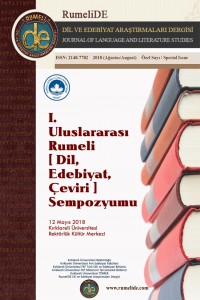Öz
Expressed in dictionaries by referring to
different concepts such as departure, transition, flight, moving and transfer;
the term migration [göç] is defined
as “the act of leaving one location for another, individually or socially;
moving or migrating from one country to another for economic, social and
political reasons”. Apart from these meanings, the term in Turkish came to
refer to “the act of migrating from this world to the afterlife, passing away,
death” starting from the 16th century onwards. This meaning was
quite often used in classical as well as modern Turkish poetry, and is perhaps
best exemplified with the koşma
(free-form folk poem) by Bayburtlu Zihni, one of the outstanding figures of
Turkish folk poetry: “I came to see that he moved his feet away from his abode”
(Vardım ki yurdundan ayak göçürmüş).
Beside poetic works, this theme has also been extensively treated by modern
literary genres such as novels and stories. It sometimes gave its name to
novels or stories, or at times featured as an element or event within the plot.
Bahaeddin Özkişi is indeed one of the important figures of Turkish literature
who failed to receive rightful attention, and fell (or was maybe deliberately
consigned) into oblivion. He deserves a special place in Turkish literature not
only with his novels but also short stories. Hence, this article attempts to
analyze the stories in his work Göç
Zamanı [Time for Migration] from a religious/mystic/metaphysical
perspective.
Anahtar Kelimeler
Göç Zamanı Bahaeddin Özkişi metaphysics/religion short story
Kaynakça
- Erbay, N. (2007), Bahaeddin Özkişi’nin Hayatı, Sanatı ve Eserleri, (Yayımlanmamış Yüksek Lisans Tezi), Atatürk Üniversitesi Sosyal Bilimler Enstitüsü, Erzurum. Gündüz, İ. (1984), Gümüşhanevi Ahmed Ziyaüddin: Hayatı, Eserleri, Tarikat Anlayışı ve Halidiyye Tarikatı, İstanbul: Seha Neşriyat. Issı, C. A. (2012), Hayat ve İnsan’ın Sokak’larında Bahaeddin Özkişi’nin Öykücülüğü, İstanbul: Roza Yayınları. Issı, C. A. (2014), “Hikâye Yazarı Bahaeddin Özkişi ve Bir ‘Mesele Etrafındaki Altı Hikâye”, Türk Edebiyatına Açılan Pencere İnci Enginün Armağanı, Ankara: Türk Kültürü Araştırma Enstitüsü Yayınları. İlhan A. (2005), Kubbealtı Lüğati Misalli Büyük Türkçe Sözlük, C. I, İstanbul: Kubbealtı Yayınları. Lekesiz, Ömer (2004), “Bahaeddin Özkişi’nin Öyküleri, Hece, S. 96, Aralık 2004, s. 103-107. Lekesiz, Ö.(2017), Öykü Menzilleri I, İstanbul: Şule Yayınları. s. 137-151. Özarslan, E. (1984), Bahaeddin Özkişi’nin Hayatı, Şahsiyeti ve Eserlerinin Tahlili Üzerine Bir Araştırma, (Yayımlanmamış Lisans Tezi), İstanbul Üniversitesi Edebiyat Fakültesi, İstanbul. Özkisi, F. (2007), Anılarla Bahaeddin Özkisiyi Anmak, İstanbul: Ötüken Yayınları. Özkişi, B. (1959), Bir Çınar Vardı, İstanbul: Vakit Matbaası. Özkişi, B. (1975), Göç Zamanı, İstanbul: Ötüken Yayınları. Özkişi, B. (2014), Göç Zamanı, (Bir Çınar Vardı, Göç Zamanı, Papağan Dedi Ki), İstanbul, 3. bs., Ötüken Yayınları. Şemseddin Sami, Kamus-i Türki, İkdam Matbaası, Dersaadet 1317/1901. Yardım, M. N. (2004), “Bir Tartışmayla Gündeme Gelen yazar: Bahaeddin Özkişi”, Türk Edebiyatı, S. 373, Kasım 2004, s. 4-10. Yardım, M. N. (2012), “Edebiyatımızın Özge Kişisi: Bahaeddin Özkişi”, Kayıp İstasyon, İstanbul: Anonim Yayınları, s. 33-51.
Öz
Sözlüklerde rihlet, intikal, hicret, taşınma,
nakil gibi farklı kavramlarla ifade edilen göç, “Ekonomik, toplumsal, siyasi
sebeplerle bireylerin veya toplulukların bir ülkeden başka bir ülkeye, bir
yerleşim yerinden başka bir yerleşim yerine gitme işi, taşınma, hicret,
muhaceret” şeklinde tanımlanır. Bu anlamlarının dışında 16. yüzyıldan itibaren
Türkçede “Dünyadan âhirete göçme, ölme, vefat” anlamlarında da
kullanılmaya başlanmıştır göç. Bu anlamıyla da gerek Klasik, gerekse Modern
Türk şiirinde pek çok yerde kullanılmıştır. Hatta halk şiirinin önde gelen
isimlerinden Bayburtlu Zihni’nin “Vardım ki yurdundan ayak göçürmüş” mısraıyla
başlayan koşması bu anlamıyla en yaygın bilinen şiirlerden birisidir. Manzum
eserlerin dışında roman, hikâye gibi modern dönemin ürünü olan türlerde de bu
konu geniş olarak işlenmiştir. Bazen roman ya da hikâyenin adı olmuş, bazen de
kurgunun içinde konu, unsur olarak yer almıştır. Türk edebiyatında uzun yıllar
hak ettiği yeri alamamış, unutulmuş/unutturulmuş isimlerden birisi de Bahaeddin
Özkişi’dir. O sadece romanlarıyla değil, yazdığı öykülerle de Türk edebiyatında
ayrı bir yerdedir. Bu makale çerçevesinde onun Göç Zamanı adlı eserinde yer alan öyküleri dinî/mistik/metafizik
açıdan değerlendirilmeye çalışılacaktır.
Anahtar Kelimeler
Kaynakça
- Erbay, N. (2007), Bahaeddin Özkişi’nin Hayatı, Sanatı ve Eserleri, (Yayımlanmamış Yüksek Lisans Tezi), Atatürk Üniversitesi Sosyal Bilimler Enstitüsü, Erzurum. Gündüz, İ. (1984), Gümüşhanevi Ahmed Ziyaüddin: Hayatı, Eserleri, Tarikat Anlayışı ve Halidiyye Tarikatı, İstanbul: Seha Neşriyat. Issı, C. A. (2012), Hayat ve İnsan’ın Sokak’larında Bahaeddin Özkişi’nin Öykücülüğü, İstanbul: Roza Yayınları. Issı, C. A. (2014), “Hikâye Yazarı Bahaeddin Özkişi ve Bir ‘Mesele Etrafındaki Altı Hikâye”, Türk Edebiyatına Açılan Pencere İnci Enginün Armağanı, Ankara: Türk Kültürü Araştırma Enstitüsü Yayınları. İlhan A. (2005), Kubbealtı Lüğati Misalli Büyük Türkçe Sözlük, C. I, İstanbul: Kubbealtı Yayınları. Lekesiz, Ömer (2004), “Bahaeddin Özkişi’nin Öyküleri, Hece, S. 96, Aralık 2004, s. 103-107. Lekesiz, Ö.(2017), Öykü Menzilleri I, İstanbul: Şule Yayınları. s. 137-151. Özarslan, E. (1984), Bahaeddin Özkişi’nin Hayatı, Şahsiyeti ve Eserlerinin Tahlili Üzerine Bir Araştırma, (Yayımlanmamış Lisans Tezi), İstanbul Üniversitesi Edebiyat Fakültesi, İstanbul. Özkisi, F. (2007), Anılarla Bahaeddin Özkisiyi Anmak, İstanbul: Ötüken Yayınları. Özkişi, B. (1959), Bir Çınar Vardı, İstanbul: Vakit Matbaası. Özkişi, B. (1975), Göç Zamanı, İstanbul: Ötüken Yayınları. Özkişi, B. (2014), Göç Zamanı, (Bir Çınar Vardı, Göç Zamanı, Papağan Dedi Ki), İstanbul, 3. bs., Ötüken Yayınları. Şemseddin Sami, Kamus-i Türki, İkdam Matbaası, Dersaadet 1317/1901. Yardım, M. N. (2004), “Bir Tartışmayla Gündeme Gelen yazar: Bahaeddin Özkişi”, Türk Edebiyatı, S. 373, Kasım 2004, s. 4-10. Yardım, M. N. (2012), “Edebiyatımızın Özge Kişisi: Bahaeddin Özkişi”, Kayıp İstasyon, İstanbul: Anonim Yayınları, s. 33-51.
Ayrıntılar
| Birincil Dil | Türkçe |
|---|---|
| Bölüm | Türk dili, kültürü ve edebiyatı |
| Yazarlar | |
| Yayımlanma Tarihi | 20 Ağustos 2018 |
| Yayımlandığı Sayı | Yıl 2018 - Özel Sayı |


